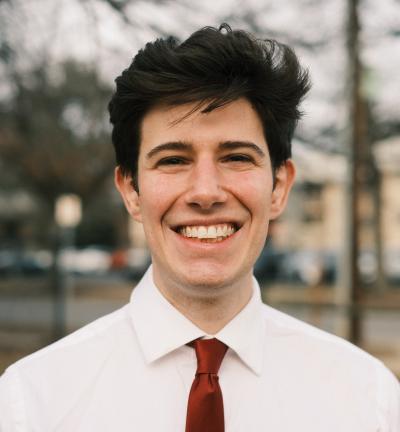Q & A with HealthConnect DC Founder and Johns Hopkins University School of Medicine Student Josh Rich
Josh Rich majored in Cell Biology & Genetics and graduated from UMD in 2022. He took two gap years, during which he worked at the National Cancer Institute as a research fellow and spent time on his nonprofit, HealthConnect DC. Josh matriculated at the Johns Hopkins University School of Medicine in the fall of 2024.

What inspired you to start a non-profit?
Back in 2021, I started to work as an EMT at a station near College Park. I started to see a lot of health disparities and health literacy issues; for example, my patients might not have known what an urgent care center was or what resources there are for mental health. A lot of my friends (my roommates were EMTs, as well) saw the same patterns, so we had this idea to support health education for underserved groups in DC.
What does your non-profit, HealthConnect DC, do for the community?
We offer a hybrid health education and health screening model. We do a basic EMT-level screening, which includes blood pressure, blood sugar, and vision. Then, we work with patients to connect them with long-term care at affordable clinics in the area. Originally, it was just me and a few others in 2022, but we’ve really expanded; for example, this spring we added 12 UMD students to be able to do more screening. It’s been rewarding to see the actual difference we make and we’ve been really lucky to have partners who give us access to so many patients.
How do you fundraise to continue to provide these services?
We have a fundraising team, but that’s definitely one of the trickiest things for us. Our primary expense is the medical supplies. Every time we take blood to measure blood sugar, we need a wipe, a bandaid, and a rubber strip. And now that we have a bigger team, we go out more often, so we run through supplies even more quickly. We also try to fundraise for medical equipment, so we are trying to purchase an AED for one of our homeless shelter providers.
Are there any anecdotes from this journey that are particularly meaningful to you?
The patient interactions are most rewarding. When we screen patients, they are sitting at our tables for a few minutes at a time and they are not afraid to share their stories with us. We’ve worked with people who have shared stories about previous addictions, newfound sobriety, what brought them to shelters, and now we get to help them on their journey back to health. We also see a lot of refugees from the Middle East, which I did not expect, but it is so meaningful for us to be able to help them get back on their feet.
What role will you take in the non-profit as you transition into medical school?
I’m still figuring that out. I’m sure I’ll play an administrative role no matter where I go. Many of our founders are still in the area, so they’ll take over and then we’ll try to recruit our newer members into leadership positions very soon, as well.
Pivoting from your non-profit, are there any other undergraduate experiences that were meaningful to you?
Working as an EMT and getting involved in Terps For Change made me realize that I really enjoyed working hands-on with people. I ultimately realized that medical school, alongside HealthConnect DC, would tie these two experiences together for me.
How do you balance it all?
I’ve worked on this over the years. I wasn’t good at it at first; as a freshman and sophomore, I’d spend all my time studying and get burnt out. So, I decided to make relationships and time for myself priorities and I realized that I could still do well. Yes, there is a little bit more stress sometimes, but I think that it’s better in the long run.
What advice would you give your younger self?
Don’t worry quite so much. As long as you're putting forth a good effort and applying yourself—whether it be to your studies, research, volunteering, or whatever else—I think it will work out in the end. Back then, I didn’t have much faith in that. But I now see that for me and most of the other people I know who really care deeply, it works out.
How and when did you prepare for the MCAT?
I began studying for the MCAT after I graduated and took it before I started my research fellowship that same August. It worked well for me to start with a content foundation and then pivot to practice; I’d recommend using UWorld and Kaplan.
Would you recommend taking gap years to pre-med students?
It’s not a one-size fits all approach, but it’s been great for me. Looking back, I may just have taken one gap year instead of two, but I decided on medicine a little later and gap years can make you a more competitive applicant. I also think it’s a good way to explore your interests, mature as a person, and relax a little bit. Some of my friends who went straight through regret not taking the time, whereas I feel like I’m going to be really old by the time I graduate. The grass is always greener on the other side, I guess!
Is there anything else you would like to share with us?
I just want to say: don’t be afraid to start something brand new. HealthConnect DC is what I talk about in my interviews when I’m asked what I am most proud of – going through that process of months of trial and error to build something from the bottom up is really special. And, the skills will benefit you in medicine and in life overall.


